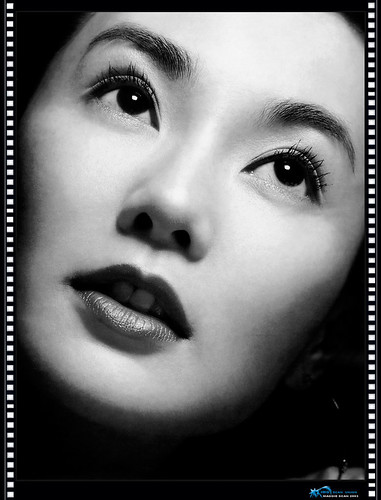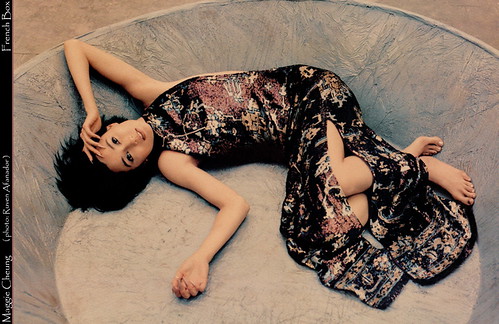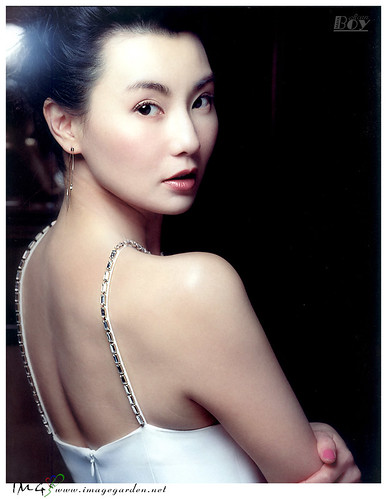
I had waited for almost 13 years to watch this film. Strongly recommended by one of my best friends in 1994, it was an art house flick I bought about a year ago and I don't understand why took me this long to finally play it. The movie is "Centrestage" or known as "The Actress" in some other parts of the world.

Starring Hong Kong's most successful and recently voted as the last Century's best Chinese actress, Maggie Cheung, this role marked the beginning of a luminous career for her. She is my undoubtedly my favourite actress who started off her career winning 1st runner up position in the 1983 Miss Hong Kong Pageant, and then going on to be a semi-finalist (the first Chinese) in the Miss World contest that year. I remember clearly when she was voted Miss Photogenic and was the (my) hot favourite for the crown, only to be pipped by the winner, who is now a virtual unknown. Starring in mainly bimbo roles after her successful Miss World stint, she was finally offered more serious roles in 1988, where out of nowhere, she walked away with her first Best Actress win at the Taiwan Golden Horse Awards -金馬獎 - (Chinese equivalent of Oscars) for her performance as one of the 3 women in the movie "Full Moon In New York" 《三個女人的故事/人在紐約》.
Proving that the success was not a fluke, she went on to grab the Best Supporting Actress the next year at the same awards for "Red Dust" 《滾滾紅塵》. "Centrestage/The Actress" was her real turning point, proving once and for all, that underneath the porcelain beauty was a real actress. She not only grabbed all the Best Actress awards at all Chinese award ceremonies, but also proceeded to win Best Actress at the Berlin Film Festival, a first timer for an Asian actress. An intelligent person, she decided to walk away from showbiz for further studies, only returning in 1996 in full triumph, winning accolades and repeating her award winning style with another one of my favourite movies "Comrades, Only a Love Story"《甜蜜蜜》, which has been described as the Chinese "The Way We Were". There was a notable maturity in her performance as she progressed as an actress and was described by the judges who voted for her, as superlative in every form, a performance that is so fulfilled that it is difficult to name another actor who had such prowess. "Comrades, Almost a Love Story"《甜蜜蜜》was also voted by US Time Magazine as one of their Top 10 Best Films of 1997.

After her marriage to a French director, Oliver Assayas, who she starred in his "Irma Vep", she came back to make make another Chinese film by famed director and friend, Wong Kar Wai (王家衛), in what many people might call her best performance yet, as the repressed lover in "In the Mood For Love" 《花樣年華》with another great Chinese Actor Tony Leung (梁朝偉). This incredibly sexy movie about love and repression set hearts soaring with their love and fans guessing if their chemistry on screen was indeed real off screen as well. Tony won the Best Actor award at Cannes and Maggie grabbed the Golden Horse Best Actress award that year, making her the most honoured actress in its history with 5 wins. Unfortunately, since it was pipped against "Crouching Tiger Hidden Dragon", who was Taiwan/HK's entry in the Oscars, "In the Mood For Love"《花樣年華》 was not eligible for a Best Foreign Oscar nomination, but won pundits from critics worldwide. They both won at the Hong Kong Film Awards, where they are both the most honoured actors in its history as well.

Maggie scored another first last year when she became the first Chinese actress again to win Best Actress at the Cannes Film Festival for "Clean". Unfortunately, she also announced that she will never star in another Wong Kar Wai movie because the last movie "2046" took 5 years to make, and most of Maggie's scenes were cut to a bare minimum. Maggie doesn't seem to have any new projects to look forward to, and I got a little distracted here, so I will return back to my review
"Centrestage/The Actress" is a biographical account of a silent movie actress Ruan Ling Yu of the late 20s and early 30s. Like Maggie, she started out playing bimbo roles but the directors recognised that she had more to offer and she started proving her worth after a few breakthroughs. Despite her fame, she was apparently down to earth and worked hard, not only to support her mother but also a child that she took under her as her own. The central theme of the movie was love because that was Ruan's biggest vice ... her vulnerability at falling in love and giving her all. The movie starts off with the director asking Maggie if she would like to be remembered decades or centuries later as a significant actress and if she desired to be a legend like Ruan, who she is playing. Maggie says No, and she can never compete with Ruan because Ruan is already a legend, since she ended her life at the young age of 25.
The movie moves along with snippets of the real Ruan, some photo stills, some real silent movie clips, returning to scenes of Maggie playing Ruan. Under a less accomplished director, the novel idea would have fallen on its face. However, these vignettes do not detract from the story, but adds on an artistic flavour to the movie, enabling the viewer to become more involved in the story telling. Maggie does not look anything like Ruan, but like Ruan, they are talented actresses. With Maggie's skill, she does not imitate or create a caricature of Ruan but recreates the mood and the feel of the actress. There is a scene where we see Maggie re-enacting a Ruan scene and it clearly shows a slight contrast in acting styles for silent and spoken movies. In silent, one has to be a lot more exaggerated, but Ruan uses her eyes to act. Maggie uses more of her chameleon face to under-act, so that she matches Ruan's power. It is fascinating to watch and it is easy to be entranced by both actresses. This is the magic of both ladies.
After gaining fame, Ruan does not rest on her laurels but strives to take on more challenging roles to expand her repertoire. Refused to be typecast, she fights to star in controversial roles about womens' movements/revolutions in the 30s when most directors would consider her too pretty to play in such roles. With such breakthroughs, she became the definitive modern woman and she was not afraid to take risks, in movies at least. However, in life, she sought to play the little woman. She desired love, and after she befriended a rich and influential man, paid monthly alimony fees to her ex-lover, who just wouldn't let go. After she starred in her last movie "Modern Women", who criticized the media's negative publicity leading to the death of a film star, the media turned their backs on her, and reported all her dalliances, with the help of her ex-lover. Thus began a tussle between the two men in her life, but unfortunately, these two men in her life fought, not for her, but more for themselves and their dignity, or lack of.
Ruan eventually takes her own life out of despair. There is a scene I love when her rich lover says that they will dress gloriously to the court so that they will be seen as high class adulterers, but Ruan, who was at the end of her life, retorted that regardless of their clothing, their actions spoke for themselves. That was the strongest move spurred on by despair. It is interesting to note that at the final scenes of the movie, Ruan (Maggie) seems to be repeating similar verses of her last letters to her lover, and it was only after the movie and some research that I realised that two such letters popped up in the media after her death, and till today remains a mystery if Ruan really did write them. The final words of Ruan was "Beware of Criticisms" ... So, was it life imitating art or the other way round again?A good movie is one that inspires the viewer to do more than just sit there. It entices involvement and interest after the movie, and "Centrestage/The Actress" is one of those gems. Love ... ultimately destroyed Ruan but does it mean that we just have to hold back and not give our all, for fear of being hurt? I was moved by the movie and since I am one that places love at the center of my life, wonder if this was a recipe for disaster? Suicide is ultimately, a selfish act, but I can totally empathise with Ruan. A reporter said that if Ruan knew 20,000 people wept at her funeral, would she have done such a "silly thing"?
Life is fragile but yet love is whole, which is why we seek for it. I have learned through time and experience that you have to give before you will receive, and that we can only give fully when we love ourselves enough. To be independent and yet interdependent. That is my important advice for anyone who wants to get into relationships and remember to love yourself in the process as well. The final lesson we can learn here is to think twice before speaking ill, because we can never know when it might turn into a matter of life and death.


在这哈韩的时代里,我希望能够掀起一股回顾风潮。回亿一些被遗忘了的好电影,好时光。最近,在新同事的交谈中,发现了自己已许久没有看华语电影了。心血來潮,一口气连接看了几部华片,也在网上购买一些陳年旧片。我已张大,再回味儿这些电影时,会否有不同感觉?感触会不会加深 。。。
记得深交在1993年极力推选,不知为何在前天才初次品味。看(阮玲玉)这部电影 。。。我感动了。。。四字遗书“人言可畏”让我深觉人是脆弱的。要在有爱的环境与哉培下,才能培养起奋斗精神。要在众人的歧视下站起来,是需要很大的力量。
虽然不熟悉阮玲玉的故事或电影,可是好电影就会加深对自己的要求,让我对阮玲玉的一生多加兴趣。在几个真实镜头中,惊叹她传神的演技,现实与剧中的她是多么的不同。勇敢作新尝试的她最后在生命中却选择了人生的句号。是恶语或爱情毁了她?把爱集为中心的人最终还是会走上悲剧的道路吗?
认识我的朋友都知道爱是我人生的中心。不喜欢吵架与分离,不否认曾有自杀念头,可是深知是自私的行为。对我来说,选择离开人生,就是放弃爱。爱人与爱己。爱人可以不要依赖,可以自由地爱。只要开始爱自己,才能把自己内心的爱全奉献出来。因为有保障,就不会那么害怕。
张曼玉是自己非常喜爱的演员。演阮玲玉这角色让她大放异彩,实至名归。不知道如果由第一选择梅艳芳来演,会有什么不同效果。很喜欢导演穿插一些阮玲玉与张曼玉真实镜头,加深了电影的艺术价值,是部不容错过的好电影。听说这电影在上映后被剪接,澳州是唯一有原片的国家,很有兴趣知道错过些什么镜头。
影片最后似乎有重复朗读遗书的镜头,后来上网才发现了有两本遗书的出现, 是否真由阮玲玉本人亲笔至今还是个谜。无论,璀璨人生如此短暂,始终是种遗憾。。。


